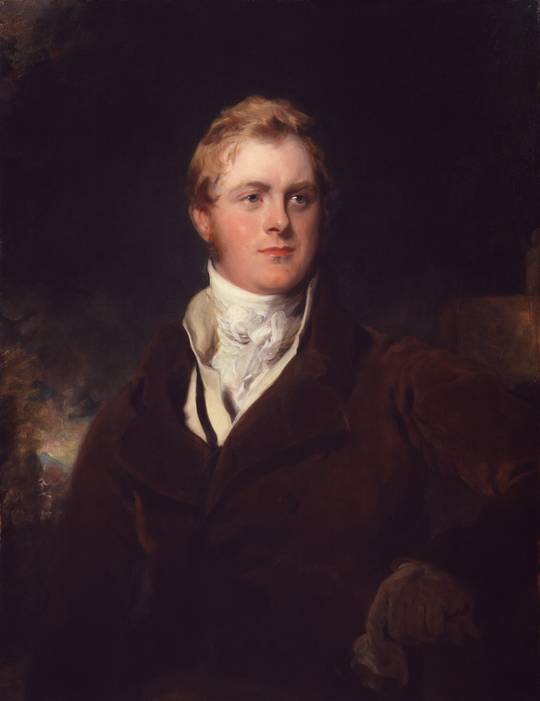Frederick John Robinson (1782-1859) First Viscount Goderich from 1827. First Earl of Ripon from 1833. President of the Board of Trade, 1818-23, 1841-43. Chancellor of the Exchequer, 1823-27. Secretary of State for War and the Colonies 1827, 1830-33. Prime Minister, 1827-28. Lord Privy Seal, 1833-34. President of the Board of Control, 1843-46. Robinson was the second son of the Whig second Baron Grantham, from a Yorkshire landed family, who had been briefly Foreign Secretary under Shelburne. He was educated at Harrow followed by St John’s College, Cambridge, a contemporary of Palmerston at both, and then admitted to Lincoln’s Inn but not called to the Bar.
Robinson entered politics sponsored by his cousin, the third Earl of Hardwicke, who, as Lord Lieutenant of Ireland, made him his private secretary. Castlereagh made him Under Secretary at the War Office in 1809, then Perceval made him a Lord of the Admiralty. Liverpool appointed him a Privy Councillor and Vice-President of the Board of Trade, from which point he became a reliable Commons speaker and advisor to Liverpool on economic matters. He was always a moderate, transferring his allegiance in 1822 easily from Castlereagh to Canning.
In January 1818 Robinson succeeded Clancarty as President of the Board of Trade with a seat in the Cabinet, then in 1823 he was promoted to the Exchequer. As Chancellor, he had a much easier job than Vansittart because of the economic growth and budgetary easing that accompanied it and, for his bombastic Budget speeches, he became known as ‘Prosperity’ Robinson. After Liverpool’s death, he was promoted to War and the Colonies under Canning, then succeeded as Prime Minister at Canning’s death but was unable to maintain his position because of a lack of decisiveness and indeed cowardice. He transferred to the Whigs in 1830, returning to War and the Colonies, then was booted upstairs as Lord Privy Seal. He switched back to the Tories in 1834, ending his ministerial career where he began it, as President of the Board of Trade and President of the Board of Control in Peel’s 1841-46 government. Finally, he followed Peel into renewed alliance with the Whigs, albeit without further office.
Robinson was able and devoted to free market economics, but idle and diffident. During the big financial crisis of December 1825, Mrs Arbuthnot reported Herries as telling her: ‘The City merchants appear to have the utmost contempt for Mr. Robinson [then Chancellor of the Exchequer], who is wholly without plan or expedients, and who does not appear to have the least idea what to do.’1 A year later, when he threatened to resign as Chancellor, Wellington referred to him as ‘the most frivolous, chicken-hearted poor creature he had ever met with’2. Fourteen months later still, Mrs. Arbuthnot summed up the ignominious demise of his government:
It appears to me clearly that, if Lord Goderich had one spark of character or spirit, that the differences between Messrs. Huskisson and Herries would not have broken up the Government; he would have settled which was right, would have forced the other to yield or to retire, instead of which he heard both, whimpered and cried, and then went to the King and resigned!3
[1] Ibid., Vol. 1, p. 417 (20 December 1825).
[2] Ibid., Vol. 2, p. 67 (16 December 1826).
[3] Ibid., p. 162 (19 February 1828).
